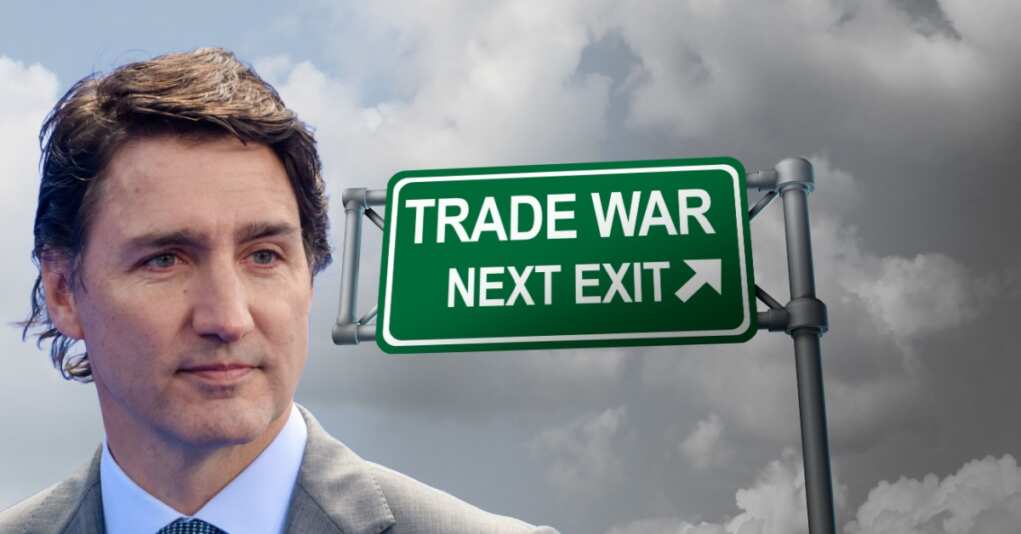Trudeau vs. Trump: A Maple-Infused Meltdown Over Tariffs

Justin Trudeau is worried, folks. The Canadian prime minister, whose biggest political achievements so far include banning plastic straws and dressing up for a Bollywood-themed costume party, is now warning President Trump that tariffs on Canadian goods will “hurt both economies.” Cue the dramatic music. Apparently, Trump’s plans to slap a 25% tariff on imports from Canada have rattled our neighbors to the north, and Trudeau is doing his best impression of a serious statesman by calling it a “lose-lose” situation.
Let’s pause here for a moment. This is the same Justin Trudeau who once lectured the world about “sunny ways” and progressive trade policies. Now he’s sounding like a Walmart greeter desperately trying to keep customers from shopping somewhere else. What’s changed? Oh, right—Trump. Canada’s economy, which relies heavily on trade with the United States, is staring down the barrel of a Trumpian tariff gun, and Trudeau knows it.
But here’s the thing: Trudeau’s plea isn’t just about protecting Canadian jobs or stabilizing his economy. It’s about optics. For a man who spends more time virtue-signaling than governing, being publicly outmaneuvered by Trump is a nightmare scenario. And yet, that’s exactly what’s happening. Trump, true to form, is playing hardball. He knows that the U.S. holds the cards in this relationship. Canada needs America far more than America needs Canada, and Trudeau’s panicked warnings only underscore that reality.
Of course, Trudeau isn’t wrong to worry. A 25% tariff on Canadian imports would hit their economy hard, particularly in key sectors like auto manufacturing and agriculture. But let’s not pretend this is some unprecedented attack on a friendly ally. Trump’s tariff threats are a direct response to years of unbalanced trade agreements that have put American workers at a disadvantage. For decades, Canada has benefited from trade deals that allow them to flood our markets while slapping their own restrictions on U.S. goods. And now, when Trump demands fairness, Trudeau suddenly remembers what a “win-win” looks like. How convenient.
The Canadian media is predictably losing its collective mind, portraying Trump as a bully and Trudeau as a valiant defender of the little guy. But here’s a question they won’t ask: if tariffs are so disastrous, why hasn’t Trudeau proposed meaningful reforms to fix the trade imbalance? Instead of addressing the root cause, he’s doubling down on emotional appeals and vague economic platitudes. It’s the political equivalent of rearranging deck chairs on the Titanic while complaining about the iceberg.
Meanwhile, let’s not forget the Democrats in all of this. They’ve been quick to criticize Trump’s tariff strategy, calling it reckless and shortsighted. But where were these voices of reason when American manufacturing jobs were disappearing under their watch? When China was eating our lunch, and NAFTA was being used as a punching bag by both parties, Democrats were more concerned about signing climate accords than protecting American workers. Now that Trump is taking a stand, they suddenly care about trade policy. Funny how that works.
And let’s talk about the impact on the U.S. economy for a second. The media would have you believe that tariffs are a death sentence for American consumers, but that’s far from the whole story. Yes, tariffs could lead to higher prices on some imported goods, but they also create leverage—leverage to renegotiate better deals, bring jobs back home, and level the playing field for American businesses. Trump isn’t just throwing darts at a trade board; he’s recalibrating an economic relationship that has been tilted against us for far too long.
The truth is, Trudeau’s warnings are less about economics and more about ego. He knows that if Trump’s tariffs go into effect, Canada will have no choice but to come back to the table and make concessions. And for a prime minister who has built his brand on being the anti-Trump, that’s a bitter pill to swallow. But here’s the thing about negotiating with Trump: it’s not about ideology; it’s about results. Trudeau can complain, posture, and virtue-signal all he wants, but at the end of the day, Trump is playing to win.
So while Trudeau wrings his hands and Canadian pundits wring their necks, Trump will keep doing what he does best: putting America first. And maybe, just maybe, Trudeau will learn that sunny ways don’t pay the bills. Until then, we’ll be here, waiting for the next maple-flavored meltdown.

